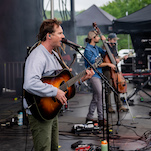Northwestern Students Fail at Journalism, Validate Every Boomer Stereotype of Young People
Photo courtesy of Getty
I can’t find the original tweet anymore, but somebody on social media Monday night hit the nail on the head. I’m paraphrasing: “The only thing worse than boomer stereotypes for millennials is when millennials live up to those stereotypes.”
Precisely. The observation came in response to this frankly stunning apology from The Daily Northwestern, the school paper at the university with one of the most prestigious journalism programs in the nation. In a joint effort involving seemingly the entire editorial staff, most or all of whom you’d have to imagine are part of the Medill School of Journalism at Northwestern, the kids managed to disgrace themselves, their university, their generation, and journalism itself by kowtowing to a grossly exaggerated version of the right’s favorite bogeyman, “P.C. culture.” It’s the kind of stuff conservatives and boomer-aged millennial and Gen. Z haters absolutely love, because it affirms all of their darkest fantasies about young liberals.
To briefly recap, the loathsome Jeff Sessions came to speak to some college Republicans at Northwestern a week earlier, and a group of students protested his appearance. It got a little aggressive, Sessions had to be escorted out, and he called the students “trash.” All good so far. The Daily Northwestern covered the protest, as they should have, and they took photos and interviewed some of the students. It was a very workmanlike, unspectacular act of journalism.
So why are they apologizing?
Great question! Let’s navigate our way through this mess, staring with the very first line:
Last week, The Daily was not the paper that Northwestern students deserve.
Hmmm, something really bad must have happened. They must have outed an anonymous source, or published private information, or endangered someone’s safety in a very real and not at all hyperbolic way. Let’s continue.
One area of our reporting that harmed many students was our photo coverage of the event. Some protesters found photos posted to reporters’ Twitter accounts retraumatizing and invasive.
Well, they were in a public place, doing a public protest, with no expectation of privacy. So tough cookies, right?
Those photos have since been taken down.
What?
On one hand, as the paper of record for Northwestern, we want to ensure students, administrators and alumni understand the gravity of the events that took place Tuesday night.
Right, since that’s journalism.
However, we decided to prioritize the trust and safety of students who were photographed.
Am I missing something? Is there a serial killer on the loose who studies photographs of protests and tracks down and murders them?
We feel that covering traumatic events requires a different response than many other stories.
TRAUMATIC?! A protest????
While our goal is to document history and spread information, nothing is more important than ensuring that our fellow students feel safe — and in situations like this, that they are benefitting from our coverage rather than being actively harmed by it.
Seriously, what is this? Did an actual journalist write this? “Ensuring that our fellow students feel safe” is not a bad goal, I guess, but it absolutely does not apply in this situation, which, again, was a public protest in a public place full of people who chose to be there. Clearly a vocal group was angry with the paper afterward for doing journalism, but the minute you let those people dictate how you cover public events, you have effectively ceased to do journalism.
Some students also voiced concern about the methods that Daily staffers used to reach out to them. Some of our staff members who were covering the event used Northwestern’s directory to obtain phone numbers for students beforehand and texted them to ask if they’d be willing to be interviewed. We recognize being contacted like this is an invasion of privacy, and we’ve spoken with those reporters — along with our entire staff — about the correct way to reach out to students for stories.
Absolutely beyond parody. This was the part that got the anti-youth crowd the most excited, because it really does read like satire. The idea that looking up somebody’s phone number and calling them is “invasive” is just too hilariously hyper-sensitive to be a real thing that a real student newspaper wrote, much less one at a school like Northwestern.
We also wanted to explain our choice to remove the name of a protester initially quoted in our article on the protest. Any information The Daily provides about the protest can be used against the participating students — while some universities grant amnesty to student protesters, Northwestern does not. We did not want to play a role in any disciplinary action that could be taken by the University. Some students have also faced threats for being sources in articles published by other outlets. When the source in our article requested their name be removed, we chose to respect the student’s concerns for their privacy and safety. As a campus newspaper covering a student body that can be very easily and directly hurt by the University, we must operate differently than a professional publication in these circumstances.
While conceding that it would be ridiculous and bad for Northwestern to punish any student engaged in a peaceful protest (and I find it doubtful that they ever would), this is another abdication of journalism. If somebody agrees to be quoted, agrees to give their name, and goes on record, that’s their decision. If they ask before the story is published to retract, a reasonable reporter might agree (but certainly isn’t compelled to). If they ask after, that’s a hard no—again, journalism shouldn’t involve being bullied into changing a story, whether it’s by a cigar-smoking oil baron or some kid who regrets going on the record. And if somebody does something illegal at a protest, or violent, that also merits coverage. Protecting people isn’t journalism’s raison d’etre…in fact, it’s the opposite.
Going forward, we are working on setting guidelines for source outreach, social media and covering marginalized groups…We will also work to balance the need for information and the potential harm our news coverage may cause. We met as a staff Sunday to discuss where our reporting and empathy fell short last week, and we are actively re-examining how we’ll address similar situations in the future and how to best move forward.
Let me spare you the suspense: You’re going to be cowards, over and over again, because that’s clearly your default instinct here. When you can be bullied off your ethics by a handful of illegitimate complaints, nobody should trust you again.
You can guess how the comments section looked:
The reaction on Twitter was the same:
i don’t doubt that these kids genuinely feel like they’re traumatized but i think that happens because they live in an environment that teaches them to be traumatized by extremely minor events and reinforces that learning with rhetoric like this https://t.co/WdfEkpguAw
— christmas cheer liz bruenig (@ebruenig) November 12, 2019
The student newspaper at Northwestern, home to one of the most prestigious journalism schools in the country, has issued a groveling apology for…doing journalism, during & after Jeff Sessions’ speech on campus. As a proud alum, I’m embarrassed by this: https://t.co/ggEPyXU8n5
— Guy Benson (@guypbenson) November 11, 2019
In appalling ignorance of the basics of news-gathering, a Northwestern student newspaper:
-apologies for taking photos of students protesting Jeff Sessions
-and for using the student directory to text students to ask if they wanted to be interviewed.https://t.co/WqceMiVLlH— Byron Tau (@ByronTau) November 12, 2019
This is called reporting. Why are you apologizing for it? Mind-boggling to read this editorial from student journalists who attend one of the top schools for journalism in the country. https://t.co/1GRPbfV8Yrpic.twitter.com/8Hf3DAFz9w
— Amy Brittain (@AmyJBrittain) November 12, 2019
Of course, some also praised the students for “thinking critically” and showing “sensitivity,” but sensitivity as a justification for abdicating journalistic responsibility is sensitivity badly directed. The rest of the discourse is just trying to re-frame the central issue in ways that are hard to dispute since they ally themselves with “marginalized communities” and use other code words that are hard to oppose but that really don’t apply here. The fact that nobody on the staff had the courage to say, “wait a second, we didn’t do anything wrong!” just shows how the culture of fear actually is dominating campuses like these.
I realize that by writing about this now, I’m amplifying in some small way the glee of the right, and I realize college kids make mistakes (I definitely did!) and that larger and darker forces are at play when it comes to the destruction of journalism. (We’ve written about those very forces here, repeatedly.)
But this incident feels very symbolic to me, especially in the wake of Splinter News and Deadspin being shuttered by venture capitalist vipers who don’t understand aggressive, progressive journalism, and certainly don’t want it to exist out in the world. Those journalists were bold, they were rude when necessary, and they always sought out the truth. When somebody told them they couldn’t do so anymore, the Deadspin staff quit en masse in an act of solidarity rather than letting themselves be constrained by the very people they stood against. Young people like the editors at the Daily Northwestern should be aspiring to their courage, even—especially—in a media ecosystem that encourages either bland corporate-friendly liberalism or rabid right-wing hate-mongering.
Here, instead, we see something so definitively weak, so definitively timid, that it’s impossible to imagine anyone who signed this letter going on to be anything other than a gatekeeper-slash-doormat in the mainstream media machine. College is a time to be extreme, to be bold, to fail by taking big chances. The compromise and capitulation is supposed to come later. Sure, the protesters in this case were not a mega-corporation, or government figures with fascist instincts, but when you can be so easily cowed by a handful of safe-spacey college kids, how can you ever muster the courage to take on real institutions of power?











































